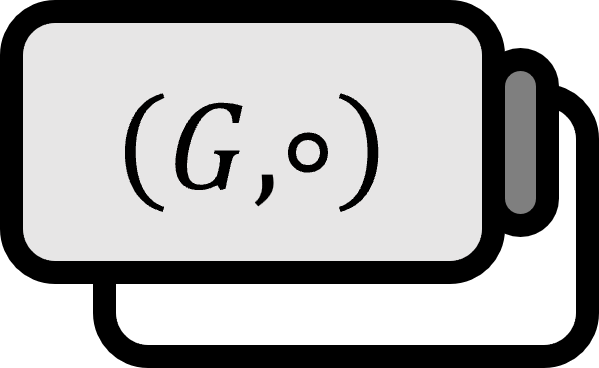Cyclic groups in Abstract Algebra
Definition 1
An element $a$ of a group $G$ is termed a cyclic group if there exists an integer $n \in \mathbb{Z}$ such that for any $x \in G$, $x = a^{n}$ holds. It is denoted as $\braket{a}$. The element $a$ is called the generator.
Explanation
Simply put, a cyclic group is one where every element can be expressed as a power of the generator. Since all elements are represented by repeated exponentiation, the term ‘cyclic’ is aptly fitting.
Though not immediately evident from the definition, every cyclic group is an Abelian group, and the generator is not necessarily unique. Theorem [1] illustrates this.
Furthermore, the definition does not necessitate that a cyclic group be a finite group. It is essential to note that $n$ exists as an integer rather than a natural number, indicating that even adding the inverse of the generator is permissible. Theorem [2] serves as an example of this.
Rotation
Let $R_{2\pi/n}$ be the rotation by an angle of $2\pi/n$ in the counterclockwise direction. Then, this becomes the generator of a rotation group completing a full circle in $n$ iterations.
$$ \braket{R_{2\pi/n}} = \left\{ R_{0}, R_{2\pi/n}, R_{4\pi/n}, \dots, R_{(n-1)\pi/n} \right\} $$
This is also referred to as a cyclic rotation group.
Theorems
- [1]: The generator of $\mathbb{Z}_{4} = \left\{ 0,1,2,3 \right\}$ is not unique.
- [2]: $\mathbb{Z}$ is a cyclic group.
Proofs
[1]
Although all elements can be represented by $1$, they can also be represented by $3$ since $3 \equiv -1 \pmod{4}$.
Thus, $\left< 1 \right> = \left< 3 \right> = \mathbb{Z}_{4}$, and it indicates that the generator is not required to be unique.
■
[2]
Every element of $\left< \mathbb{Z} , + \right>$ can be expressed as $1 \cdot n = (-1) \cdot (-n) = n$, hence $\mathbb{Z} = \left< 1 \right> = \left< -1 \right>$.
■
Fraleigh. (2003). A first course in abstract algebra(7th Edition): p59. ↩︎
